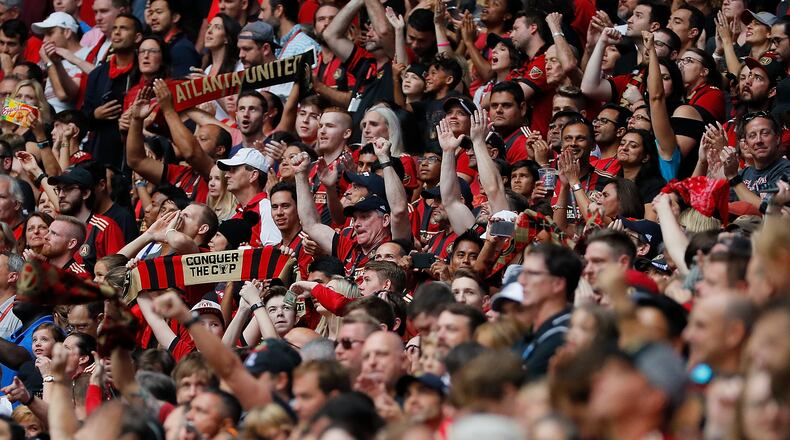When it was announced in the spring of 2014 that Major League Soccer was expanding to Atlanta, it would have been impossible even for those poor, confused souls who insisted upon calling soccer “football” to envision a scene such as Sunday.
Here was an announced audience of 71,874 – more in the 60s actually taking up space – hailing the final game of Atlanta United’s first regular season.
On an NFL Sunday, a record crowd finished off a record-breaking season – consumer-wise, at least. And as such, emphatically declared that a transplanted cutting of soccer had taken root in the hard, red clay of Georgia. More than surviving its first year, Atlanta United thrived.
“As we have grown,” said Atlanta United midfielder Jeff Larentowicz, speaking of the team, “(the fans) have grown.”
Anyone else out there a little agog? You would have been, had you ventured to Mercedes-Benz Stadium Sunday and caught the crescendo of the inaugural regular season.
A win would have been preferable – that much is as universally true about soccer as in any of your more familiar sports. But – and here things get a little odd – a 2-2 draw against the winningest team in the league, Toronto, was at least slightly useful. With that, Atlanta United finished fourth in the East and will host Columbus for one game in the MLS knockout round Thursday.
Think wildcard play-in game. And good news for the Atlanta team this time – there’s no infield fly rule.
It would have been understandable had Sunday been a mere formality, an otherwise empty appreciation for an expansion team that tried really hard. Yet, this particular expansion club was meaningful to the last minute, and will continue in that vein into the eclectic MLS postseason.
Just don’t tell any of these players that it is unusual at all for a new team to be not only in the playoffs, but also to be a bona fide threat. No opponent can be eager to play the MLS’s second-leading goal-scoring team (only Toronto scored more). Especially in what may already classify as one of the league’s most passionate venues.
“I don’t think it’s unlikely or a surprise, especially to people on the inside, that we’re in this position,” goalkeeper Brad Guzan said earlier this week.
“The feel of it since Day One has been that we were more than a first-year team,” defender Michael Parkhurst said. “The club was prepared for the season. The roster was put together well. We’ve got some great talent on this team and good role players as well. A good mix of veterans and young guys. It doesn’t surprise me at all. We’re where we thought we would be.”
Who could have foreseen anything like Sunday, as MLS soccer in Atlanta made its dizzying climb from concept to the league’s record-setting attendance champion (season average of 48,200 breaking the previous record of 44,247 set by Seattle)?
Who could have guessed that the coach of the year in Atlanta for 2017 would be an Argentine nicknamed Tata, whose press conference insights are only as good as his translator? Sorry, Dan Quinn, your calendar year began with a rather infamous collapse, while Gerardo Martino just built a contender from scratch.
Who could have known that Guzan, the keeper standing on his head once again Sunday, would put up some of the best defense seen thus far in the new stadium? Or that rookie midfielder Julian Gressel, in running half the length of the field Sunday in order to lay a lick on an attacking Torontonian, would make a free safety jealous?
And, really, who knew Atlanta could embrace soccer like this? This is stuff that would baffle even the most devout soccer cultist. Yes, even the one who can find a thrill in nil-nil. The one who begins speaking in tongues every World Cup.
It helped greatly that this team played an attractive, attacking style of soccer. Becoming just the sixth MLS team to score at least 70 goals in a season (70 even) and running up a goal differential (plus-30) that was the fourth best of all-time is good for the modern attention span.
And these fans are the ones who supply all the background noise, who generate every bit of the buzz, making a far more lovely sound than the manufactured noise inflicted upon other American games.
“What I was worried about at the beginning of the year was that the excitement would be there and it would go away,” Larentowicz said. “But I think it has done the opposite where the excitement started at a certain level and it has only drawn more people in, and created more excitement as the weeks have passed.”
An oft-fickle market has spoken. And it has said: “Gooooooooooooo(inhale)oooooooooooal.” And it will hold that thought for at least one more game.
About the Author
The Latest
Featured



